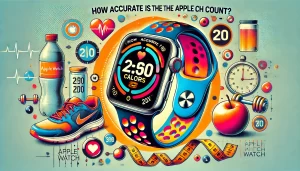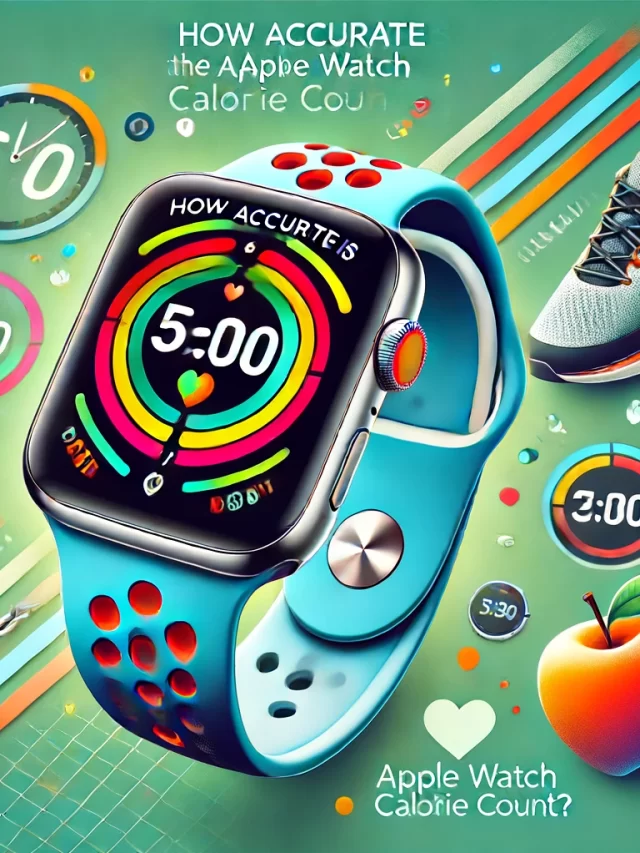The truth about the Apple Watch’s calorie tracking accuracy! Is it your ultimate fitness ally or just another gadget? Uncover real user stories, expert insights, and the science behind the tech. Empower your fitness journey with clarity and confidence. Dive in and take control of your health today!

In today’s health-conscious world, keeping track of our daily calorie intake and expenditure is more important than ever. With the rise of wearable technology, devices like the Apple Watch have become popular tools for monitoring various health metrics, including calories burned. But how accurate is the Apple Watch when it comes to calorie counting?
Understanding Calorie Tracking
What is calorie tracking? Calorie tracking involves monitoring the number of calories consumed through food and beverages and the number of calories burned through physical activities. It’s a crucial aspect of weight management and overall health.
Benefits of tracking calories By keeping an eye on your calorie intake and expenditure, you can make informed decisions about your diet and exercise routines. This helps in achieving weight loss goals, maintaining a healthy weight, and improving overall fitness levels.

The Apple Watch: An Overview
History and evolution of the Apple Watch Since its debut in 2015, the Apple Watch has evolved significantly. Initially designed as a fashionable accessory, it quickly transformed into a powerful health and fitness tool.
Features related to fitness and health The Apple Watch comes equipped with a range of features aimed at promoting a healthier lifestyle. These include heart rate monitoring, activity tracking, and, of course, calorie counting.
How the Apple Watch Tracks Calories
Sensors and technology used The Apple Watch uses advanced sensors to track various metrics. These include an accelerometer, gyroscope, and optical heart sensor, which work together to estimate the number of calories burned.
The role of heart rate monitoring Heart rate is a critical factor in calculating calories burned. By continuously monitoring your heart rate, the Apple Watch can provide a more accurate estimate of your energy expenditure.
Incorporating user data The Apple Watch also takes into account user-specific data, such as age, weight, height, and gender, to personalize calorie calculations.
Accuracy of Apple Watch Calorie Tracking
Studies and research findings Several studies have been conducted to evaluate the accuracy of the Apple Watch’s calorie tracking. While results vary, many find it to be reasonably accurate, especially when compared to other wearable devices.
Comparing Apple Watch with other devices Compared to other fitness trackers, the Apple Watch generally performs well in terms of calorie tracking accuracy. However, no device is perfect, and there are always some discrepancies.
Real-life user experiences Many users report positive experiences with the Apple Watch’s calorie tracking. However, some have noted occasional inaccuracies, particularly during specific activities or when the watch is not worn correctly.
Factors Influencing Calorie Tracking Accuracy
Physical activity type Different types of physical activities can affect the accuracy of calorie tracking. High-intensity workouts and activities that involve a lot of arm movement tend to be tracked more accurately than others.
User inputs and data Accurate user data is crucial for precise calorie tracking. Ensure your Apple Watch settings reflect your current weight, height, age, and gender.
Software and algorithm updates Apple continuously updates its software and algorithms to improve the accuracy of its devices. Keeping your Apple Watch updated ensures you benefit from these improvements.
Pros and Cons of Apple Watch Calorie Tracking
Benefits
- Convenient and easy to use
- Integrates seamlessly with other Apple devices and apps
- Provides a comprehensive view of your health and fitness
Limitations and challenges
- Occasional inaccuracies
- May not track certain activities perfectly
- Dependence on user input and correct usage
Enhancing the Accuracy of Your Apple Watch
Tips for better results
- Wear your Apple Watch snugly on your wrist
- Regularly update your personal data
- Use complementary apps to track your nutrition and exercise
Importance of regular updates Ensure your Apple Watch’s software is always up-to-date to benefit from the latest improvements in accuracy and functionality.
Using complementary apps and tools Apps like MyFitnessPal or Apple Health can provide additional data and insights, enhancing the overall accuracy of your calorie tracking.
User Experiences and Testimonials
Success stories Many users have achieved their fitness goals with the help of the Apple Watch. Success stories often highlight the motivation and insights provided by accurate calorie tracking.
Common complaints and solutions Some users have reported issues with accuracy during specific activities or due to improper wear. Ensuring the watch is worn correctly and updating user data can often resolve these issues.
Conclusion
In conclusion, the Apple Watch is a powerful tool for tracking calories and managing your fitness journey. While not perfect, it offers a reasonably accurate estimate of calories burned, especially when used correctly and kept up-to-date. By understanding its limitations and leveraging complementary tools, you can maximize the benefits of your Apple Watch.
FAQs
How does the Apple Watch calculate calories burned? The Apple Watch uses a combination of heart rate monitoring, motion data, and user-specific information to estimate calories burned.
Can I trust the calorie count on my Apple Watch? While not 100% accurate, the Apple Watch provides a reliable estimate that can help guide your fitness and health decisions.
How can I improve the accuracy of my Apple Watch’s calorie tracking? Ensure your watch is worn snugly, keep your personal data updated, and use complementary apps for additional tracking.
Are there alternatives to the Apple Watch for calorie tracking? Yes, there are several other fitness trackers on the market, such as Fitbit, Garmin, and Samsung Gear, each with its own set of features and accuracy levels.
What are the common issues users face with Apple Watch calorie tracking? Common issues include inaccuracies during specific activities or due to improper wear. Regularly updating personal data and ensuring correct wear can help mitigate these problems.

